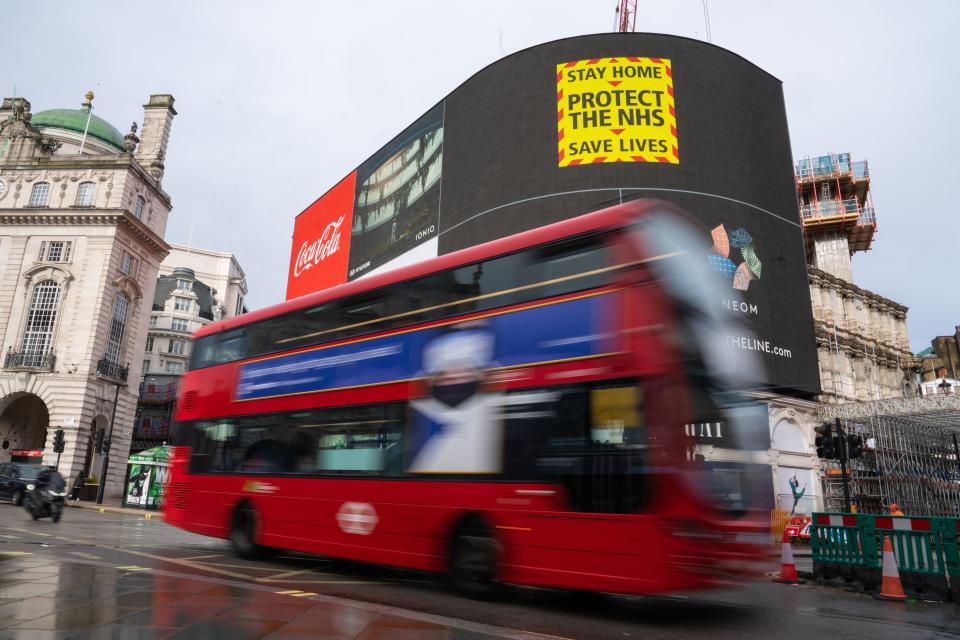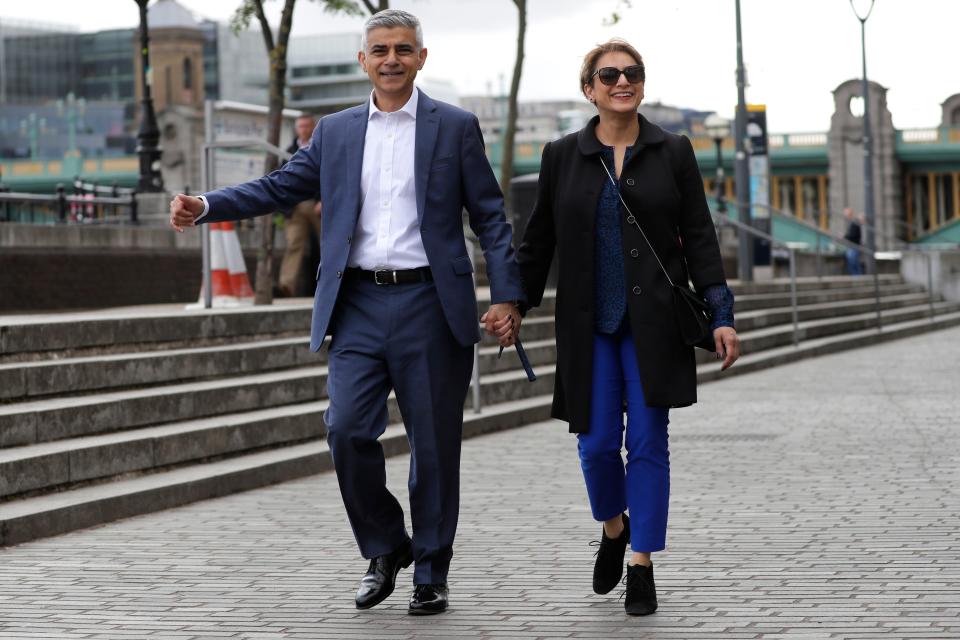Stop bickering and sort out London’s transport, say business leaders to Sadiq Khan and Grant Shapps

London business leaders today called on Sadiq Khan and Grant Shapps to stop bickering and sort out the crisis facing the capital’s transport system.
Dozens of top names including the bosses of Canary Wharf, Arcadis, the ExCeL and the New West End Company signed a joint letter to the Mayor and the Transport Secretary demanding: “Now is the time for action.”
The intervention by the business community follows months of political wrangling between City Hall and the Government over the size of a bailout to cover a catastrophic loss of ticket revenue during the pandemic. The arguments hit rock bottom this year when Boris Johnson claimed the problems at Transport for London (TfL) were “entirely the fault of the current Labour Mayor of London”, leading Mr Khan to claim the Prime Minister had “lied” in the Commons.
Calling on all sides to “come together” to devise long-term and sustainable transport solutions, the letter signed by 37 chief executives and co-ordinated by lobbying group London First warns that the stakes are too high to delay. “London does not work without public transport. And the UK cannot work without London,” they say.
The essential first step, they argue, is to continue an emergency funding deal, and then sit down to devise an entirely new transport strategy that can cope with post-pandemic working changes, the rise of ride-hailing apps and the need to cut London’s carbon emissions.
The business leaders suggest they are not opposed to new charges or different fares, saying: “We know that there is no low hanging fruit and many beneficiaries of London’s transport network – from passengers and road users to residents and businesses – will be expected to contribute in different ways.”
They say the pandemic “has broken an already strained funding model” and improvements over the past 20 years could be lost without action. “TfL needs a funding model that is based on the future needs of the city; not just a patching up of the pre-pandemic settlement.
“Trends in passenger behaviour and technology – from ride hailing and micromobility to the decline of five-day-a-week commuting – mean that the city’s needs are constantly evolving. The pandemic has accelerated much of this.”

Both the Mayor’s office and the Department for Transport responded with assurances that they were ready to work together in future.
A spokesman for the Mayor said: “This pandemic has been devastating for TfL’s finances. Securing a long-term funding settlement for the capital’s transport network is not only vital for London’s businesses and our prosperity, but will be a key driver in the recovery of the UK economy.
“The Mayor is fully committed to putting politics aside and working closely with ministers over the coming days to agree funding for TfL. Putting TfL on a sustainable financial footing after COVID-19 is simply in everyone’s interest.”
From the Government side, a spokesman said: “This Government has kept London’s transport network moving with more than £3 billion in emergency funding since the start of the pandemic. Ensuring value for money for taxpayers has been at the heart of our approach.
“Future funding packages will seek to move TfL onto a more financially sustainable footing”.
The current TfL funding package was agreed in March but runs out on May 18. A new deal will take into account how much passenger levels are rising as people return to work.
The letter in full
Dear Secretary of State and Mr Mayor,
With last week’s election concluded and the next step in the unlocking roadmap in our sights, it is time to turn our collective attention to the longer-term issues that will shape our economic recovery and future prosperity. Chief among these for our capital is agreeing a sustainable funding deal for Transport for London.
London does not work without public transport. And the UK cannot work without London. As we look to the social and economic recovery, it is essential that the whole country comes together to level up and fulfil our potential. In normal times, the capital city accounts for 24% of UK GVA and makes a net contribution of £39bn per year to the Treasury. This is facilitated by the city’s transport network. This is not just about running public transport services. TfL is an integrated city-wide transport authority and, as a result, it has been able to take a strategic view of the transport needs of the city and develop long-term investment plans. But the pandemic has broken an already strained funding model and we are deeply worried that the gains made in the two decades since the creation of TfL will be undone.
Now is the time for action. TfL needs a funding model that is based on the future needs of the city; not just a patching up of the pre-pandemic settlement. Trends in passenger behaviour and technology – from ride hailing and micromobility to the decline of five-day-a-week commuting – mean that the city’s needs are constantly evolving. The pandemic has accelerated much of this. Simultaneously we have begun to acknowledge the scale of the climate emergency that we face. In London, transport is second only to energy in terms of the city’s contribution to climate change, accounting for a quarter of all carbon emissions. Driving this number down will require more, cleaner public transport. But it will also require active support for other green forms of transport and city-wide coordination of the significant infrastructure investments and operational adjustments necessary to enable new technologies. The necessity of a new funding model for TfL provides an opportunity to recast London’s transport authority not just as a public transport provider (with a few regulatory duties) but as an integrated sustainable transport authority that is empowered to help create a city fit for the 2030s and beyond.
In the short-term, a rollover of TfL’s emergency funding deal is necessary to ensure that under-funded transport services do not inhibit the recovery. This - coupled with coordination between central government, City Hall, and operators – will be crucial to the safe return to city life over the coming months. Attention must then turn to developing a sustainable long-term deal. This should be pursued with vigour and pragmatism. We know that there is no low hanging fruit and many beneficiaries of London’s transport network – from passengers and road users to residents and businesses – will be expected to contribute in different ways. As business leaders in London, we are ready to work constructively with central and London government, to identify solutions for the good of the city, the national economy, and the planet.
Yours sincerely,
Mark Allan, Chief Executive, Landsec
Paul Barnes, Chief Executive, Association of International Retail
Brian Bickell, Chief Executive, Shaftesbury
Simon Carter, Chief Executive, British Land
Toby Courtauld, Chief Executive, Great Portland Estates
Dyan Crowther, Chief Executive, HS1
Kate Davies, Chief Executive, Notting Hill Genesis
Wim Dejonghe, Senior Partner, Allen & Overy
John Dickie, Chief Executive, London First
Jon Di-Stefano, Chief Executive, Telford Homes
Nic Durston, Chief Executive, South Bank Employers’ Group
Ruth Duston OBE OC, Chief Executive, South Westminster BIDs
Helen Evans, Chief Executive, Network Homes
Patrick Franco, Chief Operating Officer, Foxtons
Daniel Hajjar, Managing Principal, HOK
James Harris, Group Managing Director, Mott MacDonald
Peter Hogg, London City Executive, Arcadis
Killian Hurley, Chief Executive, Mount Anvil
Stephanie Hyde, CEO UK, JLL
Gerald Kaye, Chief Executive, Helical
Shobi Khan, Chief Executive, Canary Wharf Group
Kirsten Lees, Managing Partner, Grimshaw
Roy McGowan, Managing Director, Momentum Transport Consultancy
Darrell Mercer, Group Chief Executive, A2Dominion
Ros Morgan, Chief Executive, Heart of London Business Alliance
John Murphy, Chief Executive, J Murphy & Sons Ltd
Tomoo Nakamura, Managing Director, Mitsui Fudosan UK
Geeta Nanda, Chief Executive, Metropolitan Thames Valley Housing
Scott Parson, Chief Operating Officer, Unibail-Rodamco-Westfield
James Raynor, Chief Executive, Grosvenor
Jeremy Rees, Chief Executive, ExCel London
Chris Rumfitt, Chief Executive, Field Consulting
Brendan Sarsfield, Chief Executive, Peabody
Hugh Seaborn, Chairman, Brompton Road Partnership
Jace Tyrrell, Chief Executive, New West End Company
Will Wilson, Chief Executive, Siemens Mobility
Colin Wood, Chief Executive, AECOM Europe
Read More
Bosses list pleas for Sadiq Khan as he is re-elected as London mayor
‘Humbled’ Khan vows to ‘build bridges’ in second term as London Mayor
Sadiq Khan opponents increase strength on London Assembly

 Yahoo Finance
Yahoo Finance 